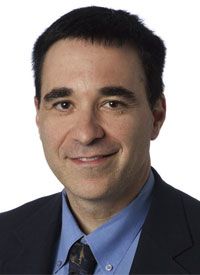Avelumab Demonstrates Durable Activity in Merkel Cell Carcinoma
According to results of the phase II JAVELIN Merkel 200 study, the PD-L1 inhibitor avelumab (Bavencio) induced an objective response rate (ORR) of 33% in patients with advanced Merkel cell carcinoma, including 2 additional complete responses (CR) since the primary analysis.
Howard L. Kaufman, MD

Howard L. Kaufman, MD
According to results of the phase II JAVELIN Merkel 200 study, the PD-L1 inhibitor avelumab (Bavencio) induced an objective response rate (ORR) of 33% in patients with advanced Merkel cell carcinoma, including 2 additional complete responses (CR) since the primary analysis.
The updated ORR, which was determined after a median follow-up of 16.4 months (minimum, 1 year), comprised 29 responses, including 10 complete responses (11.4%; 95% CI, 6.6-19.9) and 19 partial responses (PR; 21.6%; 95% CI, 13.5-31.7). In the primary results from the trial, which occurred after a median follow-up of 10.4 months (minimum, 6 months), the ORR was 31.8% (28 responses), including 8 CRs and 20 PRs. The increase in CRs, was due to 1 new CR and 1 previously reported PR becoming a CR.
In the latest data, which were presented at the 2017 AACR Annual Meeting, the median duration of response (DOR) was not yet reached, and the 6-month durable response rate was 30.6% (95% CI, 20.9-40.3). At 1 year, 23.9% of patients remained in response (95% CI, 15.4-34.1). The DOR was at least 6 months in 93% of patients, with 74% of patients having a DOR of 1 year or more. Based on the JAVELIN Merkel 200 data, avelumab recently became the first ever treatment approved by the FDA for Merkel cell carcinoma.
“Avelumab monotherapy showed durable antitumor activity and manageable safety in patients with metastatic Merkel cell carcinoma that progressed after chemotherapy,” said lead study author Howard L. Kaufman, MD, a surgical oncologist at Rutgers Cancer Institute of New Jersey. “Maturing progression-free survival (PFS) and overall survival (OS) data suggest that we are going to see long-term benefits similar to other diseases where checkpoint inhibitors have been used.”
The JAVELIN Merkel 200 study (NCT02155647) enrolled 88 previously treated patients with metastatic Merkel cell carcinoma. The median age of patients in the study was 72.5 years, and each received avelumab at 10 mg/kg every 2 weeks. Patients had received at least 1 prior therapy (59.1%), with 11.4% having ≥3 prior systemic treatments. Most patients in the study were male (73.9%) and the ECOG performance status was 0 (55.7%) or 1 (44.3%).
The most common site of primary tumor was the skin (76.1%) and all patients had metastatic involvement at the time of study entry. Visceral disease was present for 53.4% of patients. Overall, 65.9% of patients were PD-L1­positive and 52.3% were positive for the Merkel cell polyomavirus (MCPyV).
The median time to treatment response was 6.1 weeks (range, 6-36). Twenty-two (75.9%) of the 29 responses were observed by week 7 and 21 (72.4%) were ongoing. The ORR was 36.2% in the PD-L1­positive arm and 18.8% in the PD-L1­–negative group. The response rate in those who were not evaluable for PD-L1 status was 35.7%. The ORRs were 28.3% and 35.5% in the MCPyV-positive and -negative arms, respectively. In those not evaluable for the virus, the ORR was 45.5%. The ORR was 40.4% among patients who had received 1 prior treatment versus 22.2% among patients who had received 2 or more prior therapies.
The 1-year PFS rate was 30% (95% CI, 21-41) and the 1-year OS rate was 52% (95% CI, 41-62).
Sixty-nine (78.4%) patients discontinued treatment. The most common reasons for discontinuation included progression (50%), adverse event (AE; 8%), death (8%), and withdrawal of consent (4.5%).
The most frequently reported grade 3/4 AEs included anemia (10.2%), hypertension (5.7%), and fatigue, musculoskeletal pain, abdominal pain, and decreased appetite (2.3% each). Three patients experienced grade 3/4 immune-mediated AEs, which included 1 case each of hypothyroidism, alanine aminotransferase increase, and transaminases increase.
The specific FDA-approved indication for avelumab is for use as a first or second-line treatment for adults and pediatric patients 12 years and older with metastatic Merkel cell carcinoma.
In his concluding remarks, Kaufman expressed his enthusiasm over this treatment breakthrough. “This is a terrible disease; we’ve seen doubling times of 24 hourswe see this tumor just take over these patients very quickly. So, to have something that can just turn it around like this has really been amazing; it’s been really great to watch some of these patients doing so well for so long now.”
Reference:
Kaufman HL, Russell JS, Hamid O, et al. Durable responses to avelumab (anti-PD-L1) in patients with Merkel cell carcinoma progressed after chemotherapy: 1-year efficacy update. Presented at the 2017 AACR Annual Meeting; April 2-5, Washington, DC. Abstract CT079.
The most common all-grade AEs included fatigue (50%), musculoskeletal pain (31.8%), diarrhea (22.7%), nausea (21.6%), rash (21.6%), peripheral edema (20.5%), decreased appetite (20.5%), cough (18.2%), constipation (17%), arthralgia (15.9%), abdominal pain (15.9%), anemia (14.8%), decreased weight (14.8%), dizziness (13.6%), vomiting (12.5%), hypertension (12.5%), dyspnea (11.4%), pruritus (10.2%), and headache (10.2%). Infusion-related AEs occurred in 21.6% of patients, with no grade 3/4 events.